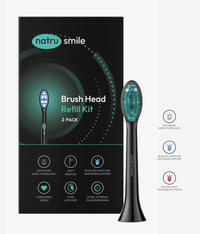
All products are certified by dental expert Dr. Greg Grillo
Get ready to unlock the secrets of a dazzling smile! In today's fast-paced world, taking good care of your oral health is essential, and what better way to do so than with the power of vitamins? We've got you covered with this all-inclusive guide, as we delve into the top vitamins for teeth that will give you healthy gums and strong pearly whites.
Why Take Vitamins For Teeth? Overview
Inadequate vitamin intake can lead to various dental problems such as tooth decay, gum disease, and weakened enamel. Ensuring you consume the right vitamins good for teeth can prevent these issues, promote healthy oral tissues, and support overall dental health.
5 Vitamins For Healthy Gums And Teeth
Let's dive into the world of essential vitamins and minerals that play a pivotal role in maintaining oral health.
Calcium
Calcium is the backbone of strong teeth and bones. This essential mineral fortifies your teeth, strengthening the enamel and supporting jawbone health. It also aids in preventing tooth decay and gum disease. Dairy products, leafy greens, and fortified non-dairy alternatives are all excellent sources of calcium.
Top Calcium-rich Foods:
- Dairy products (milk, cheese, yogurt)
- Leafy greens (kale, spinach, collard greens)
- Fortified non-dairy milk (almond, soy, oat)
- Tofu
- Sardines and salmon (with bones)
Vitamin C
Vitamin C is a potent antioxidant that strengthens the gums and soft tissues in the mouth. It supports collagen synthesis, which is crucial for healthy gums, and helps fight off infections. Consuming vitamin C-rich foods such as citrus fruits, berries, and bell peppers can significantly benefit your dental health.
Top Vitamin C-rich Foods:
- Citrus fruits (oranges, grapefruit, lemon)
- Berries (strawberries, raspberries, blueberries)
- Kiwi
- Bell peppers
- Broccoli
- Pineapple
Vitamin D
Vitamin D is indispensable for optimal oral health, as it aids in calcium absorption. This vitamin ensures your teeth and gums utilize the calcium they receive effectively. Exposure to sunlight and consuming vitamin D-rich foods like fatty fish, egg yolks, and fortified milk can help maintain healthy levels of vitamin D.
Top Vitamin D-rich Foods:
- Fatty fish (salmon, mackerel, sardines)
- Egg yolks
- Fortified milk (dairy and non-dairy)
- Beef liver
- Cheese
- Mushrooms
Vitamin A
Vitamin A is essential for maintaining healthy mucous membranes and salivary flow in the mouth. It also helps keep gums healthy and aids in wound healing. Foods rich in vitamin A include sweet potatoes, carrots, kale, and beef liver.
Top Vitamin A-rich Foods:
- Sweet potatoes
- Carrots
- Kale
- Spinach
- Beef liver
- Apricots
Phosphorus
Phosphorus is another essential mineral that works hand-in-hand with calcium to strengthen teeth and bones. It also helps protect tooth enamel by maintaining the balance of acid and alkaline in the mouth. You can find phosphorus in foods like fish, lean meats, and whole grains.
Top Phosphorus-rich Foods:
- Fish (salmon, tuna, mackerel)
- Lean meats (chicken, turkey, beef)
- Whole grains (brown rice, oats, quinoa)
- Nuts and seeds (almonds, sunflower seeds, pumpkin seeds)
- Legumes (beans, lentils, chickpeas)
When To Take Vitamins: Timing And Consistency For Optimal Oral Health
Supplementing your diet with vitamins is most effective when done consistently and in proper amounts. In this section, we'll explore the importance of when to take vitamins, how to incorporate them into your daily routine, and strategies for maximizing their benefits for oral health.
The Importance Of Timing And Consistency
When it comes to vitamins and minerals, timing and consistency are crucial for reaping their full benefits. To maintain optimal oral health, it's essential to ensure your body receives a steady supply of these nutrients, as they play an integral role in various dental processes like tooth remineralization, gum health, and immune function.
A balanced diet that consistently provides the necessary vitamins for teeth and gums can help prevent dental issues, promote overall dental health, and contribute to a radiant smile.
Incorporating Vitamins Into Your Daily Routine
To ensure that you're consuming an adequate amount of vitamins for oral health, incorporate nutrient-rich foods into your daily meals and snacks. Here are some examples of vitamin-rich foods for healthy teeth and gums:
- Calcium: Dairy products, leafy greens, almonds, and fortified non-dairy alternatives
- Vitamin C: Citrus fruits, berries, bell peppers, and broccoli
- Vitamin D: Fatty fish, egg yolks, fortified milk, and sunlight exposure
- Vitamin A: Sweet potatoes, carrots, kale, and beef liver
- Phosphorus: Fish, lean meats, whole grains, and nuts
By including a variety of these foods in your diet, you can help ensure your body receives the essential vitamins and minerals it needs for strong teeth and healthy gums.
Optimal Times To Take Vitamin Supplements
If you struggle to get enough vitamins from food, consider taking supplements as recommended by your healthcare provider. When it comes to supplementation, the best time to take vitamins can vary depending on the type of vitamin and your individual needs. Here are some general guidelines:
- Fat-soluble vitamins (A, D, E, and K): These vitamins are best absorbed when taken with a meal containing fat, as they require fat for proper absorption.
- Water-soluble vitamins (B and C): These vitamins can be taken with or without food, as they are easily absorbed by the body. However, they're best consumed in smaller doses throughout the day, as the body doesn't store them in large amounts.
Always consult your healthcare provider for personalized advice on the optimal timing and dosage for vitamin supplements.
Combining Vitamins For Enhanced Absorption
Some vitamins and minerals work synergistically, meaning they enhance each other's absorption and efficacy when consumed together. For instance, vitamin D is crucial for calcium absorption, so it's essential to ensure you have adequate levels of both nutrients for strong teeth and bones.
Pairing vitamins and minerals that work together in your diet or supplementation routine can help maximize their benefits for oral health. Consult your healthcare provider or a registered dietitian for personalized guidance on combining vitamins and minerals for optimal absorption.
Why Are Vitamins So Important For Oral Health?
Maintaining a healthy balance of essential vitamins and minerals is crucial for your overall well-being. Ensuring that you receive the necessary nutrients, specifically vitamins for teeth and gums, will not only benefit your oral health but also contribute to a healthy body and a strong immune system.
Are Gummy Vitamins Bad For Teeth?
While gummy vitamins are a popular and convenient supplement option, they can be detrimental to teeth due to their sugar content and sticky texture, which can adhere to tooth surfaces and cause cavities. If you opt for gummy vitamins, consider the following:
- Brush your teeth after consuming them
- Look for low-sugar or sugar-free options
- Consider an alternative form of supplementation if possible
Can Vitamins Discolor Teeth?
Some vitamins, like iron supplements, can cause temporary tooth discoloration. However, most vitamins and minerals do not have this side effect. If you experience tooth discoloration, take the following steps:
- Consult your dentist or healthcare provider for advice
- Maintain good oral hygiene practices to minimize staining
Can Vitamins Make Teeth Sensitive?
Vitamins themselves typically do not cause tooth sensitivity. However, acidic vitamin C supplements may cause temporary sensitivity in some individuals. If you experience sensitivity, consider the following:
- Use a different form of supplementation
- Consume vitamin C-rich foods instead
Can Vitamins Whiten Teeth?
Vitamins alone cannot whiten teeth, as teeth whitening relies on removing surface stains from the enamel. However, consuming a balanced diet rich in essential vitamins and minerals can help maintain strong and healthy teeth, which may appear whiter as a result.
Can Vitamins Stain Teeth?
Most vitamins do not stain teeth. However, certain supplements, like iron and some liquid multivitamins, may cause temporary staining. To minimize the risk of staining, follow these tips:
- Adhere to the recommended dosage
- Brush your teeth regularly
- Consult your healthcare provider if you have concerns
Can Vitamins Strengthen Teeth?
Yes, specific vitamins and minerals, such as calcium, phosphorus, and vitamin D, are essential for strengthening teeth and maintaining optimal oral health. A balanced diet containing these essential nutrients can significantly contribute to strong teeth and overall dental health.
Can Vitamins Cause Tooth Staining?
While most vitamins do not cause tooth staining, certain supplements like iron and some liquid multivitamins may lead to temporary discoloration. To reduce the risk of staining, adhere to the recommended dosage, practice good oral hygiene, and consult your healthcare provider for guidance.
In Closing: Vitamins For A Healthy Smile
In summary, maintaining a healthy balance of essential vitamins and minerals is crucial for optimal oral health. Consuming a balanced diet rich in vitamins for teeth and gums can help prevent dental issues, promote overall dental health, and contribute to a radiant smile.
Remember that calcium, vitamin C, vitamin D, vitamin A, and phosphorus are vital for strong teeth and healthy gums. Aim to obtain these essential nutrients from a diverse diet, and consider supplementation if necessary.
Though vitamins alone cannot whiten or stain teeth, they play an indispensable role in supporting oral health, which can lead to a more attractive and confident smile. Always consult your healthcare provider or dentist for personalized advice and guidance on the best ways to care for your teeth and gums.
Invest in your oral health by prioritizing essential vitamins and minerals, and enjoy the benefits of a strong, healthy smile for years to come.












